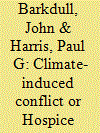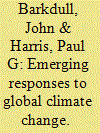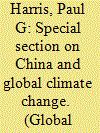|
|
|
Sort Order |
|
|
|
Items / Page
|
|
|
|
|
|
|
| Srl | Item |
| 1 |
ID:
139224


|
|
|
|
|
| Summary/Abstract |
What are the implications of global climate change for peace and human welfare in the future? The answer depends on the actual effects of climate change and how the world responds to them. Current economic and political systems are unlikely to produce the policy and institutional changes needed to reduce adequately the greenhouse gas (GHG) emissions causing the problem, so some of the most dangerous effects of climate change could occur this century. Some observers posit that climate change will result in catastrophe, but specifics of this catastrophe range widely. Does climate change mean painful but manageable social disruption, requiring, for instance, populations to move and cities to be rebuilt? Or does climate change portend much worse, including major wars, the end of modern civilization or, incredibly, even the eventual extinction of humanity? If these more severe consequences are likely or possible, what kind of global society would be best able to survive, or at least cope? The answer may be found in eco-socialism and a ‘Hospice Earth’ that nurtures people and societies regardless of how bad the future becomes.
|
|
|
|
|
|
|
|
|
|
|
|
|
|
|
|
| 2 |
ID:
062223


|
|
|
|
|
| Publication |
London, Earthscan, 2005.
|
| Description |
xviii, 269p.
|
| Standard Number |
1853839728
|
|
|
|
|
|
|
|
|
|
|
|
Copies: C:1/I:0,R:0,Q:0
Circulation
| Accession# | Call# | Current Location | Status | Policy | Location |
| 049685 | 333.72095/HAR 049685 | Main | On Shelf | General | |
|
|
|
|
| 3 |
ID:
169168


|
|
|
|
|
| Summary/Abstract |
Ecosystem-based adaptation (EbA) has recently emerged as an important way to address the impacts of climate change. EbA suggests that harnessing ecosystem services can help communities adapt to climate change, thereby limiting threats to social systems and human security. What are the arguments for and against EbA? Who favours EbA? What does EbA mean in practice? What are the limits to EbA as global average temperature rises? Reviewing documents of non-governmental organisations, governments, intergovernmental organisations and scholars helps answer these and related questions. As climate change results in increasing challenges for society, the more important all forms of adaptation, including EbA, will become. Yet, while useful and appropriate in certain contexts, EbA might not be sufficient if climate disruption becomes severe, which would require consideration of a transformational change in global institutions and practices.
|
|
|
|
|
|
|
|
|
|
|
|
|
|
|
|
| 4 |
ID:
094191


|
|
|
|
|
| Publication |
London, Routledge, 2009.
|
| Description |
xx, 223p.
|
| Series |
Routledge advances in international relations and global politics; 70
|
| Standard Number |
9780415483438
|
|
|
|
|
|
|
|
|
|
|
|
Copies: C:1/I:0,R:0,Q:0
Circulation
| Accession# | Call# | Current Location | Status | Policy | Location |
| 054797 | 363.70526/HAR 054797 | Main | On Shelf | General | |
|
|
|
|
| 5 |
ID:
060147


|
|
|
| 6 |
ID:
085484


|
|
|
| 7 |
ID:
112323


|
|
|
|
|
| Publication |
2012.
|
| Summary/Abstract |
The diversity of greenhouse gas (GHG) accounting methodologies currently utilized by cities around the world make meaningful comparisons of their emissions almost impossible. Consequently, the 2010 United Nations International Standard for Determining Greenhouse Gas Emissions for Cities promotes a "harmonized protocol for quantifying the GHG emissions attributable to cities and local regions." The UN's common standard has important implications for comparison, benchmarking and policy assessment related to energy policies. This paper uses Hong Kong as a case study to illustrate these implications. Hong Kong's per capita contribution to GHG emissions are among the highest in the world, yet the local government's official statistics indicate emissions that are far below those reported by most affluent economies. This discrepancy arises from a reporting methodology that does not require inclusion of GHG emissions linked to consumption of imported goods or emissions from aviation and shipping. The Hong Kong case reveals that current inventories do not provide sufficient information to guide policymaking related to energy and climate change. They also do not provide adequate information for comparing policies of cities internationally. Alternative emissions-reporting standards that focus more on pollution from consumption will create avenues for more effective climate-related policies.
|
|
|
|
|
|
|
|
|
|
|
|
|
|
|
|
| 8 |
ID:
105160


|
|
|
|
|
| Publication |
2011.
|
| Summary/Abstract |
Climate change presents much of the world, and possibly most of it in the long term, with chronic human insecurity. More than any other country, China has become a central actor in the practical and political aspects of this problem. On a practical level, it is the largest national source of greenhouse gases (GHGs) causing global warming, and the rapid increase in its GHG emissions means that its contribution to climate change will continue to grow for some time. Politically, China's role in climate change diplomacy is crucial to so-far failed efforts by states to reach consensus on robust efforts to reduce GHG pollution and to respond to the inevitable consequences of climate change. China's domestic policy responses to the problem convey important signals that will influence the behaviour of other national actors. Without China playing a major part in efforts to curb GHG pollution, notably through limitations on its future emissions, international efforts to mitigate global warming substantially will certainly fail.
|
|
|
|
|
|
|
|
|
|
|
|
|
|
|
|
|
|
|
|
|